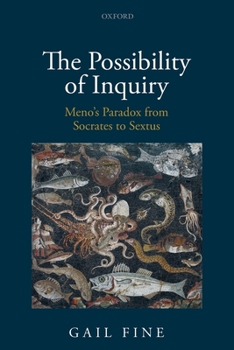Possibility of Inquiry: Meno's Paradox from Socrates to Sextus
Select Format
Select Condition 
Book Overview
Gail Fine presents an original interpretation of a compelling puzzle in ancient philosophy. Meno's Paradox, which is first formulated in Plato's Meno, challenges the very possibility of inquiry. Plato replies with the theory of recollection, according to which we all had prenatal knowledge of some range of things, and what we call inquiry involves recollecting what we previously knew; he also illustrates this with his famous cross-examination of an untutored slave about a geometry problem, whose solution the slave is able to discover through inquiry. Hence, contrary to the paradox, inquiry is possible after all. Plato is not the only philosopher to grapple with Meno's Paradox: so too do Aristotle, the Epicureans, the Stoics, and Sextus. How do their various replies compare with one another, and with Plato's? How good are any of their replies? In a fascinating fragment preserved in Damascius' Commentary on the Phaedo, Plutarch briefly considers these questions (though for obvious chronological reasons he doesn't discuss Sextus). But Fine's book is the first full-length systematic treatment of the paradox and responses to it. Among the topics discussed are the nature of knowledge; how knowledge differs from mere true belief; the nature of inquiry; varieties of innatism; concepts and meaning; the scope and limits of experience. The Possibility of Inquiry will be of interest to anyone interested in ancient epistemology, in ancient philosophy, or in epistemology.
Format:Paperback
Language:English
ISBN:0198822642
ISBN13:9780198822646
Release Date:December 2018
Publisher:Oxford Univ PR
Length:414 Pages
Weight:1.45 lbs.
Dimensions:0.9" x 6.0" x 9.2"
Related Subjects
PhilosophyCustomer Reviews
0 rating





